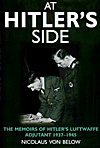 Greenhill, 2001, 18.95 pounds, ISBN 1-85367-468-0, 256 pages hardback
Greenhill, 2001, 18.95 pounds, ISBN 1-85367-468-0, 256 pages hardback
The real trick in reading memoirs is to judge the validity of honesty inherent in the work. Winners tend to exaggerate their own efforts and overlook failures while losers tend to deflect blame. Diaries, such as the Halder diaries, are inherently more honest than say, memoirs written in Spandau.
And yet, even the most self-serving memoir contains bits and pieces of the whole picture, that when compared with all the other memoirs and the actual events, yield a greater understanding of the subject.
Von Below's memoirs, released in 1980 as Als Hitlers Adjutant 1937-1945, ranges from incredibly interesting to utter rubbish. As Luftwaffe adjutant, I find his explanation and descriptions of the progress and decline of the German Air Force to be genuinely accurate in tone and fact. The sheer number of events, decisions, and reactions handled by Hitler will amaze you, and the facts and reports generated by others provide an inside look at HQ Central. For example, the JU-88 debate in 1937 exemplifies the facts side of history, and Mussolini's dealings provide the tone, which is most important in a book like this.
There's one part when the world starts to unravel for Hitler. The Battle of Britain is not going well, and talks with Lavel of Vichy France and Franco of Spain about joining the German Alliance with Italy, Romania, and Hungary just fell through. A letter arrives from Mussolini to the effect of, "Good News. We just invaded Greece."
Now the many pages before report on Hitler's efforts to secure the Balkans from turmoil as plans to invade the Soviet Union progressed. And in one fell swoop, Il Duce ruins everything. Strangely, Hitler, he of many tantrums in other books, is calm and quickly patches together an invasion of Greece and Yugoslavia.
As for the rubbish part of the bargain, here's a fellow who universally idolized Hitler, thought Hitler's marathon after-dinner speeches were terrific, and knew the war was lost long before anyone else did. He had no knowledge of any mass murders, concentration camps, or final solutions. Hitler liked honest reports from his generals. Hitler hinted the war was lost in mid-July 1944, and then acknowledged the fact after the failed Ardennes offensive, but his iron will kept Germany fighting.
The prose for all of the above is straightforward, if a tad dry. The events and impressions are related simply.
Von Below's memoirs offer a ring of truth surrounded by some fuzzy dismissals of reality. He shifts blame here and there, emphasizes his clear thinking and sage advice to Hitler, and upholds the tradition of the officer corps. Parts of the book show what a memoir should do to examine events and enlighten us. Other parts embody the "hear no evil, see no evil, speak no evil" plague of defeated leaders. Yet it does offer a glimpse, no matter how rose-tinted the glasses, of the internal workings and emotions of Fuhrer HQ, and especially the Luftwaffe. For that, At Hitler's Side is a valuable addition to any study of WWII leadership.
Info: Greenhill:
E-mail for more information
www.greenhillbooks.com
Back to List of Book Reviews: World War II
Back to Master List of Book Reviews
Back to Master Magazine List
© Copyright 2001 by Coalition Web, Inc.
This article appears in MagWeb (Magazine Web) on the Internet World Wide Web.
Other military history articles and gaming articles are available at http://www.magweb.com